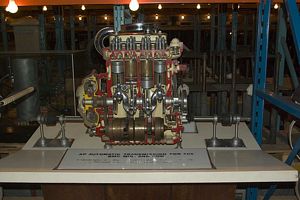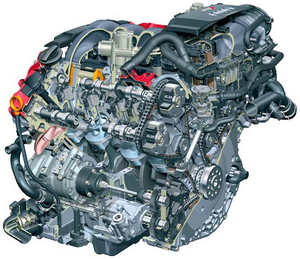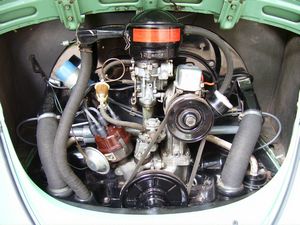|
By accessing or using The Crittenden Automotive Library™/CarsAndRacingStuff.com, you signify your agreement with the Terms of Use on our Legal Information page. Our Privacy Policy is also available there. |

What are the best engines of all time?
|
|---|
|
|
What are the best engines of all time?
Matt Hubbard
Speedmonkey
February 6, 2013
 BMC A Series BMC A Series
 Audi 4.2 litre V8 Audi 4.2 litre V8
 Volkswagen air cooled engine Volkswagen air cooled engine
|
The engine is the beating heart of a motor car. An engine can be large or small, powerful or weak, economical or thirsty, loud or quiet, diesel or petrol - or even hybrid.
Over the decades certain engines have taken on a mystique. They might have powered an iconic vehicle, such as the 6.1 litre V12 BMW unit used in the McLaren F1, or they may have seen long service, such as the L410 (6.75 litre V8) used in Rolls Royces and Bentleys from 1952 until the present day.
We want you to tell us your favourite engine of all time, either in the comments section below, on Twitter, or on Facebook.
For the record these are Speedmonkey's three favourite engines. It was difficult selecting just three, which is why the floor is open to readers to select their own.
BMC A Series
Not one of the biggest, most economical, powerful or even most reliable motors, the British Motor Corporation's A Series unit is certainly one of the most influential and long lived of all engines. Launched in 1951 in the Austin A30 (as an 803cc) the A Series has a cast iron block and cylinder head, and steel crankshaft. It's last outing was in the 2000 Mini. The A Series was available in many variations over it's history from the 803cc through to the 1275cc fitted to later Mini Coopers - but all have the same distinctive engine note. It's place in history was established when it was fitted to the Mini, and even won a round of the WRC - it powered Paddy Hopkirk to his famous 1964 Monte Carlo victory.
Audi 4.2 litre V8
A modern icon. The Audi 4.2 V8 features cast aluminium alloy cylinder block and heads, has double overhead cams and comes with 32 or 40 valves. It is used in an array of Audi models from the B6 S4, the RS6, R8 and in premium Volkswagen models. It comes as a normally aspirated unit with 340bhp in the S4 or S6, or with twin turbos in most other models. In the R8 it produces 430bhp. As well as producing oodles of power the Audi 4.2 is high revving (8250rpm in the R8), sounds like a V8 should and delivers it's power right through the rev range. Most Audi V8's have timing belts but in order to squeeze it in the S4's tight engine bay the 4.2 was fitted with a timing chain.
Volkswagen air cooled engine
Even older than the A Series, the VW air-cooled lump has been in production since 1936. It features a flat 4 boxer configuration with cast aluminium alloy cylinder heads, cast iron cylinders and a magnesium crankcase. The engine was available in 1.1, 1.2, 1.3, 1.5, 1.6 and even 2 litre configurations. It's main use was in VW's own Beetles and Transporters, but it was also found in the Brazilian VW SP-2, Karmann Ghia, VW Puma, Porsche 914 and light aircraft. The air cooled VW engine's legacy carried through to Porsche, which used a similar unit all the way through until 1997 when the 996 debuted as the first 911 with a water cooled engine. The air-cooled boxer engine note is as distinctive as any engine. It has a massive global fanbase partially down to it's simplicity, which makes it easy to work on, but also because so many people have owned one.
The Audi 4.2 V8, BMC A Series and VW's air-cooled boxer are our nominations for greatest engines of all time but it would be remiss not to mention Jaguar's current 4.2 litre V8 - used to superb effect in it's entire range, and the AMG 6.2 litre V8 - which has one of the best engine notes ever.
What are your favourite engines?

















 BMC A Series
BMC A Series
 Audi 4.2 litre V8
Audi 4.2 litre V8
 Volkswagen air cooled engine
Volkswagen air cooled engine
